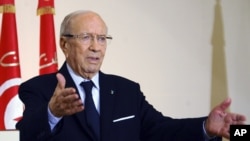President Barack Obama on Thursday designated Tunisia as a major non-NATO ally of the United States, praising its democratic reforms in the aftermath of the 2011 Arab Spring uprising.
The North African nation becomes the 16th country the U.S. has given the designation to, strengthening the military and financial links between the two countries while not creating a mutual defense agreement. Since 1989, the U.S. has created the alliances for European countries outside of its key North Atlantic Treaty Organization.
Obama met at the White House with Tunisian President Beji Caid Essebsi, who came to power following historic elections in December. The American leader said he was pleased to hear of Tunisia's political change to a democracy. Essebsi is the first democratically elected leader in Tunisia's 60-year history.
The American leader pledged short-term U.S. aid for Tunis to complete its economic reforms and combat unemployment.
"At this critical time in world history, we think it's very important for us to continue to expand the economic assistance that we're providing so that ordinary Tunisians can feel the concrete benefits of a change to a more open and competitive economy," Obama told reporters.
The White House said the U.S. would offer up to $500 million in loan guarantees to the North African nation if needed for economic reforms.
"I committed that as Tunisia continues to embark on important structural reforms to the economy, that we will not only provide short-term aid, but also try to provide the kind of bridge and support that's necessary to complete those reforms," Obama said.
The leaders also discussed joint counterterrorism efforts and the need to stabilize Libya "so that we don't have a failed state and a power vacuum that ends up infecting the situation in Tunisia as well," Obama said, referring to Tunisia's much larger neighbor to the East.
President Essebsi told Obama that Tunisia's transformation continues to be threatened by terrorist groups. He told reporters that his country has "a long way ahead of us" to completely transform its political system and economy and needed support from the United States.
"The democratic process is always vulnerable and threatened by terrorists, by parties that do not believe in democracy," Essebsi said, speaking through a translator.
"We are almost midway," he said of ongoing democratic reforms. "This year will finalize other reforms, [and the] objective is to reform the economy but also send message to world that Tunisia is a favorable place for investment and growth."
Longtime Tunisian President Zine El-Abidine Ben Ali was ousted by democratic protests in 2011 that inspired the Arab Spring uprisings across North Africa and the Middle East.
The country has since held several successful elections, and despite bouts of violence, the country's secular and Islamist parties have largely avoided the turmoil that spread through other Arab Spring countries.
Co-authored opinion article
An opinion piece Thursday in The Washington Post, Obama and Essebsi wrote, "Tunisia shows that democracy is not only possible but also necessary in North Africa and the Middle East.
"Today's national unity government includes secularists and Islamists, proving that democracy and Islam can thrive together," the op-ed continued.
Essebsi, who is Tunisia's first democratically elected president since the country gained independence from France in 1956, has pledged to institute democratic reforms.
In March, a terrorist attack killed 22 people at the country's National Bardo Museum. The attack, which was claimed by Islamic State militants, raised concerns about the government's ability to stop terror attacks and further damaged the country's tourist industry.
On Wednesday, Essebsi met with U.S. Secretary of State John Kerry, who said Tunisia's successes show that despite difficulties, democratic institutions "can succeed when they have courageous leadership and when they have compromise."
Portions of this report are from Reuters.





